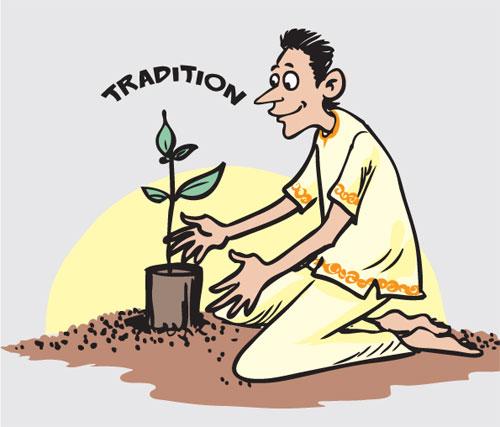Reply To:
Name - Reply Comment
 he Sinhala and Tamil New Year has much to offer in terms of traditions which the dominant majority of this country boast of. Some practise these traditions with awareness while a good
he Sinhala and Tamil New Year has much to offer in terms of traditions which the dominant majority of this country boast of. Some practise these traditions with awareness while a good  number of them merely go through the motions. Recently there was a Facebook post regarding New Year traditions by a reputed statesman, author and writer who said that ‘traditions are practices that are followed by a community without checking whether such rituals are right or wrong’.
number of them merely go through the motions. Recently there was a Facebook post regarding New Year traditions by a reputed statesman, author and writer who said that ‘traditions are practices that are followed by a community without checking whether such rituals are right or wrong’.
There is danger in quoting the name of this popular statesman because social media sites are full of fake profiles and it could lead the way to a lawsuit in the case this is not the account of this statesman. But this particular post in this site is pregnant with meaning and merits analysis and comment.
Why do we continue with such traditions? The youth of this country are more and more moving towards rational thinking which makes them view tradition with skepticism. The senior citizens of this country have been made to stop and think what the younger generation would sport as their identity because the ‘youth’ are so disassociated with tradition.
Coming back to that Facebook post there were more comments which took the author to task for questioning tradition, but most of them lacked substance. But one comment put most who joined in the forum-the aggressive ones- in their place. This post said, ‘traditions must continue because they have helped the Sinhala race survive the tests of time’.
Now we are talking! Why? Because unlike in the past so much inter-cultural and inter-religious marriages are taking place and events like the New Year create that opportunity for the Sinhalese and Tamils to stay rooted to their clans.
The British invaded Sri Lanka many years ago and left their footprint here in a profound way; one of the repercussions being that they gave birth to a community we fondly know as ‘kalu suddas’ which in English terms is a community greatly influenced by the white
man’s thinking.
This could be the reason why we see people with an aristocratic background travelling excessively during the New Year days and not bothering to remain at home to welcome visitors.
The news that the earnings from the expressways in the country earning a record income of Rs 320 million during the period April 5-16 leaves us wondering whether much of the travelling was done to visit relations during the new year or whether to escape from the hustle and bustle of the festive season.
Despite a fair share of the present generation showing a lukewarm interest towards these traditions we read much about the crowds that flocked to Kataragama during the New Year days to honour traction and take part in rituals.
There was a heavy influx of devotees to Kataragama and Kiriwehera since the dawn of April 14 to take part in ceremonies like the boiling of milk after the doors of the ‘Mahadevale’-the main shrine- were open. This tradition is said to have continued since the times of King Dutugemunu. It was followed by reading of the Budget of the Mahadevale which is known as ‘Dekum kiyaweema’. These events were followed by an event known as ‘Dewa Danaya’ which is an offering of a meal to the Gods prepared from the first yield of we paddy obtained from the Yala harvest.
We also heard of a new addition to existing traditions. President Maithripala Sirisena is reported to have planted a sapling on Monday (16) at the auspicious time of 11.17 am giving birth to a new tradition of planting a sapling or a seed-as requested by the president himself-during the New Year period.
New Year traditions might not guarantee improvement in the country’s economic profile, but they give us that sense of belonging here in this island which is steeped in history and legend.